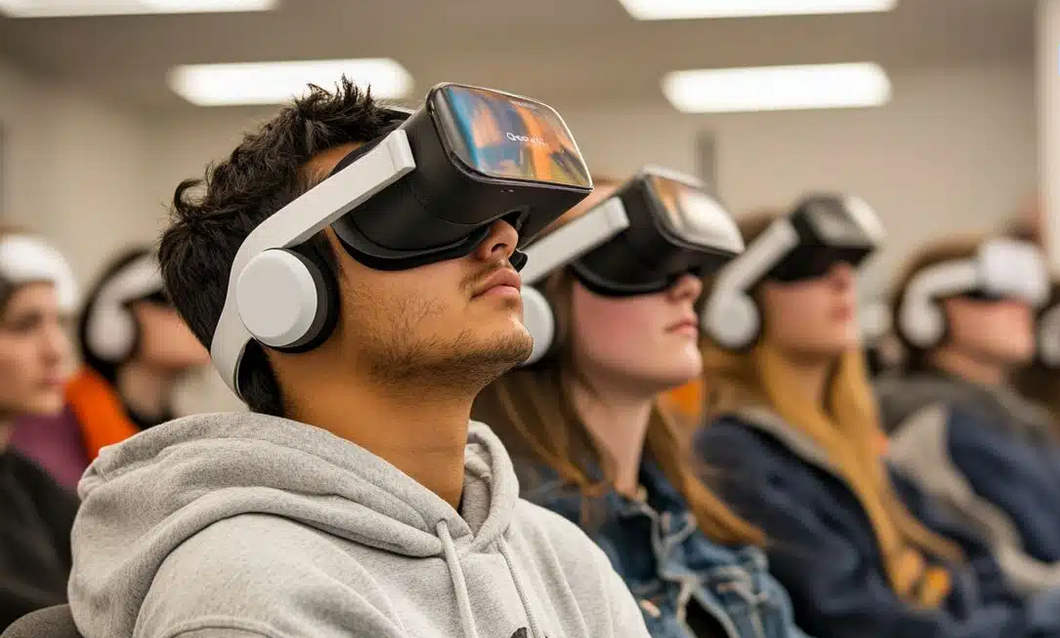Meta has officially launched its Meta for Education beta program, a cutting-edge initiative designed to revolutionize the way students learn through immersive virtual reality (VR) and extended reality (XR) applications. Leveraging Meta’s popular Quest VR headsets, the program seeks to create educational experiences that are interactive, accessible, and globally scalable, bridging the gap between traditional classrooms and virtual learning environments.
By introducing this program, Meta aims to expand learning opportunities, enabling students to engage with content and simulations that might otherwise be inaccessible due to geographical, financial, or logistical limitations. The beta program marks a significant step toward integrating immersive technology into mainstream education.
Collaboration with Leading Universities
To ensure the program meets educational standards and delivers meaningful learning experiences, Meta has partnered with more than a dozen prestigious universities across the United States and the United Kingdom. Among the participating institutions are Imperial College London, the University of Leeds, and the University of Glasgow.
Through these partnerships, Meta is working closely with educators to test state-of-the-art teaching tools and immersive learning modules. The collaboration allows universities to tailor the VR and XR experiences to their curricula, enhancing student engagement while providing critical feedback to refine Meta’s educational apps before broader deployment.
Monica Arés, Executive Director of Imperial IDEA Lab at Imperial College London, emphasized the potential of this initiative to blend the digital and physical worlds. According to Arés, the program demonstrates how immersive technology can create more engaging and interactive learning opportunities, ultimately enriching the student experience.
Introducing Europe’s Digital Twin Metaversities
A central component of Meta’s educational vision is the creation of digital twin “metaversities” across Europe. In collaboration with VictoryXR, Meta is constructing virtual replicas of real-world campuses, allowing students and instructors to interact in fully immersive environments.
The initial wave of metaversities includes:
-
University of Leeds, United Kingdom – Offering immersive courses and even performance and theater classes as of September.
-
University of the Basque Country, Spain – Integrating VR for physiotherapy and anatomy courses, expected to launch in early 2025.
-
University of Hannover, Germany – Expanding immersive learning across multiple disciplines.
These digital twin metaversities allow students to attend live classes, collaborate on projects, and participate in social activities without leaving their homes. By mirroring real campuses, these virtual environments aim to preserve the sense of community and interaction found in traditional educational settings while removing geographic barriers.
In addition to providing virtual classrooms, the metaversities offer students access to resources such as laboratories, simulations, and collaborative workspaces that are often costly or difficult to replicate in the physical world. This approach not only enhances accessibility but also allows universities to experiment with innovative teaching methods.
Expanding Immersive Learning Across Disciplines
Meta’s initiative is not limited to higher education. The company is actively providing tools and resources to help educators integrate VR and XR into their teaching practices. By supporting organizations like the Immersive Learning Academy in the Netherlands, Meta is promoting the adoption of VR-based methods in both academic and lifelong learning contexts.
In France, Meta is assisting France Immersive Learning in publishing an English-language reference guide for educators, offering practical advice on incorporating VR into classrooms. This effort aims to build a foundation for sustainable immersive learning that can be adapted across cultures, languages, and educational systems.
The focus on immersive learning also extends to vocational and professional education. By using VR and XR technologies, students and trainees can practice skills in realistic, risk-free simulations, whether in healthcare, engineering, or the performing arts. For example, VR-based physiotherapy training allows students to practice techniques with virtual patients, providing a hands-on experience that would otherwise require costly resources.
Advantages of Meta for Education
The Meta for Education beta program introduces several transformative benefits for students, educators, and institutions:
-
Enhanced Engagement – Interactive VR and XR simulations create more compelling learning experiences compared to traditional lectures or online videos.
-
Accessibility – Virtual campuses and immersive apps remove geographical and financial barriers, enabling students worldwide to access quality education.
-
Innovative Teaching Tools – Educators can utilize simulations, interactive labs, and gamified experiences to reinforce learning outcomes.
-
Scalable Learning – Institutions can extend their reach to larger student populations without physical space limitations.
-
Collaborative Learning – Students can work together in virtual spaces, fostering teamwork and communication skills even when remote.
-
Interdisciplinary Applications – From physiotherapy and anatomy to performing arts and engineering, immersive learning supports diverse fields of study.
Preparing for the Future of Education
Meta’s education initiative aligns with a broader trend toward digital transformation in learning environments. As educational institutions increasingly adopt technology-driven teaching methods, immersive VR and XR solutions provide the next frontier for engaging students, enhancing accessibility, and improving educational outcomes.
Digital twin metaversities, in particular, have the potential to reshape the traditional campus experience. By offering realistic virtual environments, students can interact with peers and instructors in ways that closely mimic in-person experiences, while also gaining access to resources and opportunities that would be otherwise unavailable.
This approach also encourages universities to experiment with new pedagogical models, including blended learning, flipped classrooms, and fully remote immersive courses. By integrating these technologies early, institutions position themselves at the forefront of education innovation, preparing students for a future where digital literacy and technological fluency are essential.
The Role of Meta and VictoryXR
Meta’s partnership with VictoryXR is critical to realizing the full potential of metaversities. VictoryXR specializes in creating immersive educational content and virtual campus experiences, bringing technical expertise to complement Meta’s hardware and AI-driven applications. Together, they are building scalable, accessible platforms that extend the reach of quality education globally.
This collaboration reflects a shift from the traditional “super app” approach, favoring modular, task-specific solutions that address distinct educational challenges. Rather than combining all features into a single tool, Meta and its partners focus on creating targeted experiences that can be adapted to the needs of different universities, disciplines, and students.
Conclusion
The launch of the Meta for Education beta program represents a significant leap forward in the integration of VR and XR technology in education. By partnering with prestigious universities in Europe and the US, developing digital twin metaversities, and providing tools to support immersive teaching, Meta is pioneering a new era of interactive and accessible learning.
This initiative has the potential to transform how students learn, offering immersive simulations, virtual labs, and interactive experiences that go far beyond traditional classrooms. As VR and XR technologies continue to evolve, programs like Meta for Education could become a standard part of global educational ecosystems, benefiting students, educators, and institutions alike.
By focusing on innovation, accessibility, and collaboration, Meta is setting the stage for a future where education is not limited by location, resources, or traditional classroom constraints, empowering students worldwide to learn in ways previously unimaginable.




